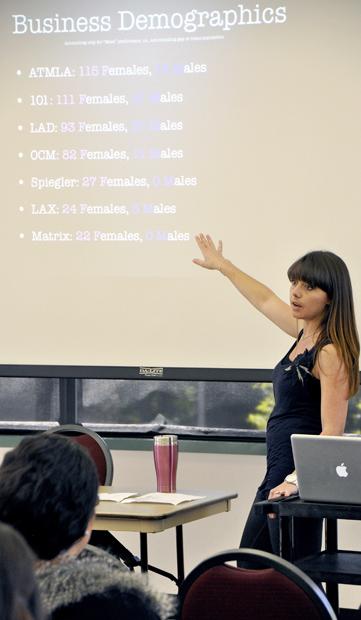
Correction>> The last quote was originally incorrect and has since been reworded.
Jennie Ketcham, former porn star and current CSUN psychology major, dispelled myths about the porn industry providing actors an endlessly glamorous lifestyle during the lecture “Porn’s Glass Ceiling: An Illusionary Wage Gap,” in the USU Tuesday.
After a lucrative eight year run as an award-winning porn actress, Kecham gave up drugs and alcohol and realized she could not continue the job while sober.
“I thought it would validate me, so I did nude modeling, the gateway drug to hard core porn. I didn’t realize that validation can come from inside,” said Ketcham, author of “I Am Jennie.” “Nothing about what I did gave me skills to live in the real world.”
Ketcham said “average females” are porn stars that are not in high demand. They are very easily replaceable and their careers often do not last longer than a year. She estimated that they can make about $88,000 a year doing two scenes a week or 162 a year. The “average male,” whose careers have more longevity at an average of five years, can make comparable income but must perform about four scenes a week.
“Exceptional females,” or those in very high demand, can make their careers last closer to 10 years at $249,600 a year, doing about four a week or 192 a year. “Exceptional males,” who can make their careers last the longest at 15 years, will make slightly more, about $268,800 a year, but have to perform almost every day at about 336 scenes a year.
Exact numbers are hard to find because of how closed off the industry tries to be, but estimates were based off figures she came across when working as a director, she said.
“Porn is the greatest myth of the entertainment business because no one knows about it,” Ketcham said. “I knew if I spoke out I would be blacklisted and it would take away that temptation, I couldn’t go back – it’s like erasing your drug dealers phone number.”
At high rates and a fast turn around, Ketcham said the glass ceiling for the porn industry is that performers have to give up more to make more, all together making it an unsustainable career.
“I have a friend that has been in the business for seven years and just did her first anal scene for $10,000,” Ketcham said.
“Tomorrow it will go back to the regular rate of $1,300 and now that people expect it, they want you to do it now.”
Whatever reasons people have for getting into the industry, decisions start with the discrepancy between who they really are and who they ideally want to be, Ketcham said. “When I was young I didn’t know where I fit in. I didn’t know my role in family or my family’s role in society (and) I felt muddled and confused,” she said.
Although many people blame linear causality, saying it is their family or societies fault that they joined the industry, Ketcham does not subscribe to this theory. She said circular causality, thinking she needed the money to support her drug habits and constantly buy more drugs, was closer to the truth.
The real reason, however, is equafinality, meaning that there are several reasons that people make decisions and they often lead back to feeling the need to match others expectations of themselves, she said.
“We are never above sweeping floors to get into a company. I’m not above making coffee to get into the world I want to be in,” Ketcham said. “If you feel entitled you are going to feel pissed off for a long time. You will feel so distracted by the things you feel are being done to you that you cannot do things for yourself.”






